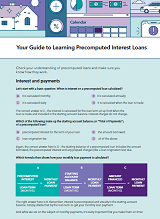Understanding How a Precomputed Loan Works

Summary
A precomputed loan is a loan where the interest is calculated at the beginning and applied to each payment. Learn more about precomputed loans.
In this article:
- What are precomputed loans?
- What are the benefits of a precomputed loan?
- How does a precomputed loan work?
- What happens if I miss a payment or make a late payment?
- What happens if I pay off the loan early?
- How is the interest refund (or rebate) calculated at payoff?
- A recap of precomputed interest loans.
What are precomputed loans?
When you get a personal loan, it is understood that you’ll need to pay it back with interest. That is why the total amount you pay back is more than the amount you borrowed. However, the way interest is calculated can be different depending on the type of loan you have.
A precomputed loan calculates the total interest for your loan term up front when you open your loan. This is an important distinction from daily simple interest loans, which calculate interest on an unpaid principal balance as payments are made. With a precomputed interest loan, all the interest is calculated at the beginning.
A precomputed loan is made up of:
- The amount you borrow, also called the amount financed
- The interest for the loan term, also called precomputed interest
- Any prepaid finance charges your lender may charge you. Prepaid finance charges are loan fees (like a loan origination fee) charged in addition to interest
The amount financed, the precomputed interest and any prepaid finance charges are added together and included in your starting account balance. Your monthly loan payment is your starting account balance divided by your loan term.
What are the benefits of a precomputed loan?
Life can be unpredictable, and sometimes the unexpected happens. Maybe your roof is leaking, or your car has broken down and you need to make urgent repairs. Or maybe you need to consolidate several debts into one new loan.
Like all loans from OneMain Financial, a precomputed loan offers several benefits, including a clear payment schedule, fixed interest rate and fixed monthly loan payment. With so many other surprises that life can throw your way, you can at least be sure that, if you make your payments on time, your loan won’t be one of them.
How does a precomputed loan work?
To show you how precomputed loans work and where the interest calculation fits in, here is an example:
Let’s say you want to borrow $3,000, an amount you plan to pay back over three years (36 months). The loan has an origination fee1 of $129. Interest is 25% annually.
The amount financed plus any origination fees is called the principal.

The interest is calculated for the 36-month term and added to the principal. This is the amount that you will need to pay back. With a precomputed loan, this is called your starting account balance and is referred to as the “Total of Payments” amount in your loan agreement.

To determine the monthly loan payment, simply divide the “Total of Payments” by the term, or number of months, of the loan (in this example, 36). So, your monthly loan payment would be $4,293.72 divided by 36 months = $119.27.

Since monthly loan payments are applied to reduce your account balance, the first payment of $119.27 reduces your account balance to $4,174.45.
What happens if I miss a payment or make a late payment?
Your loan agreement requires you to make a monthly loan payment by the specified due date. If you pay after the due date or do not pay the amount due, your lender may charge a late fee. If your loan agreement allows a lender to collect the late fee from your payment first, less of your monthly payment goes toward reducing your account balance. And your credit report may show the payment as late or missed. If you miss multiple payments, then collection action may also be taken. That’s why it’s very important to make your monthly loan payments on time.
What happens if I pay off the loan early?
With a precomputed loan, the interest charged is based on your loan term. That means that if you pay back the loan early, the lender may not have “earned” all the precomputed interest, and you may be entitled to a refund (or rebate). The amount of your refund or rebate depends on how long it took you to repay your loan. You can also check your loan agreement for more details on how your refund or rebate is calculated and consult with your loan specialist in this situation.
Let’s revisit our example loan above. At 25% annual interest, on a 36-month term, the starting account balance of $4,293.72 meant that monthly loan payments are $119.27.
Suppose you make regular, timely payments of $119.27 for 23 months of that 36-month term. This means you will have repaid $2,743.21 of your $4,293.72 starting balance. Your remaining account balance will be $1,550.51.

If you decide to pay off your loan early, in month 24, then not all the precomputed interest of $1,162.74 will have been “earned” by the lender. Any unearned interest is refunded to you by subtracting it from your account balance, thus reducing your final payoff amount.
How is the interest refund (or rebate) calculated at payoff?
There are two methods used to calculate your interest refund or rebate. One is called the Rule of 78s, and the other is the actuarial method. Remember to check your loan agreement to see how a refund on your loan would be calculated.
Rule of 78s
The Rule of 78s is named after the sum of the digits of the months in a year:
1 + 2 + 3 + 4 + 5 + 6 + 7 + 8 + 9 + 10 + 11 + 12 = 78
For a one-year loan (12 months), the total sum of the digits = 78
Each month in the loan term gets a value that is the opposite of when it occurs in the loan term. So, for a loan with a 12-month term, month 1 gets a value of 12, month 2 is 11, month 3 is 10, and so on.
If you pay off a 12-month loan after two months, the lender adds the value of months 1 and 2 (12+ 11 = 23) and divides it by the total value of 78. (23/78 = 29.48%). The lender gets to keep 29.48% of the interest. This is the earned interest.
What this means is that using the Rule of 78s, more interest is earned in the beginning of the loan since the amount owed is greater. So, the Rule of 78s can mean a lower refund or rebate in the beginning of the loan term because of the higher amount of earned interest.Actuarial method
Under the actuarial method, interest is calculated based on each scheduled payment due date. For each due date, interest is calculated up to the date that the payment is made and subtracted from the payment amount. The remaining amount of each payment is then applied to principal.
Ok, let’s revisit our example loan once more, and for this illustration, we will use the Rule of 78s.
The account balance after 23 months is $1,550.51. Because you pay your loan off in month 24, the “earned” interest is $1,028.40. It would have been $1,164.72 if you had paid the loan over the full 36-month term. You will have an interest refund due of $136.32.

Your interest refund or rebate is subtracted from your account balance and your remaining account balance (plus any unpaid fees or charges) is your payoff amount. In our example of a 36-month term loan, this is $1,414.19 shown below.

A recap of precomputed interest loans.
Here are SIX things to remember about precomputed interest loans
All interest charges are calculated up front. Interest charges do not change.
Your monthly payment will depend on how much you borrow, any prepaid finance charges, the interest rate charged, and the term (or length) of the loan.
Each monthly payment is applied towards reducing your account balance.
If you continue to make your scheduled monthly loan payments on time, your account balance will be $0 at the end of the scheduled loan term.
If you miss a payment or pay late, your lender may charge you late fees, and your credit report may show missed or late payments. Several repeated late or missed payments may result in collection action.
You may be entitled to an interest refund or rebate if you pay your loan off early.
Congratulations for taking the time to find out more about how a precomputed loan works. You should now have a good understanding of how the key terminology, how the interest is calculated, and what happens if you make late payments or wish to pay back your loan early. If you have any additional questions, we encourage you to contact us here.
- OneMain charges loan origination fees. Depending on the state where you you’re your loan, the origination fee may be either a flat amount or a percentage of your loan amount. Learn more here.
This article is for general education and informational purposes, without any express or implied warranty of any kind, including warranties of accuracy, completeness, or fitness for any purpose and is not intended to be and does not constitute financial, legal, tax, or any other advice. Parties (other than sponsored partners of OneMain Financial (OMF)) referenced in the article are not sponsors of, do not endorse, and are not otherwise affiliated with OMF.




